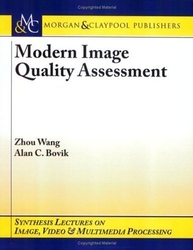Modern Image Quality Assessment (原版:9781598290226)
暫譯: 現代影像品質評估
Wang/Bovik
- 出版商: Morgan & Claypool
- 出版日期: 2006-02-08
- 售價: $1,930
- 貴賓價: 9.5 折 $1,834
- 語言: 英文
- 頁數: 160
- ISBN: 159829363X
- ISBN-13: 9781598293630
海外代購書籍(需單獨結帳)
買這商品的人也買了...
-
 人月神話:軟體專案管理之道 (20 週年紀念版)(The Mythical Man-Month: Essays on Software Engineering, Anniversary Edition, 2/e)
人月神話:軟體專案管理之道 (20 週年紀念版)(The Mythical Man-Month: Essays on Software Engineering, Anniversary Edition, 2/e)$480$379 -
 Windows 驅動程式設計指南 (Programming the Microsoft Windows Driver Model, 2/e)
Windows 驅動程式設計指南 (Programming the Microsoft Windows Driver Model, 2/e)$890$703 -
 初探無線網路 (Wireless Networks First-Step)
初探無線網路 (Wireless Networks First-Step)$290$247 -
 GNU Make 專案開發工具 (Managing Projects with GNU Make, 3/e)
GNU Make 專案開發工具 (Managing Projects with GNU Make, 3/e)$620$490 -
 深入淺出設計模式 (Head First Design Patterns)
深入淺出設計模式 (Head First Design Patterns)$880$695 -
 作業系統原理 (Silberschatz: Operating System Principles, 7/e)
作業系統原理 (Silberschatz: Operating System Principles, 7/e)$780$741 -
 CSS Layout 達人的階梯
CSS Layout 達人的階梯$520$411 -
 Linux 驅動程式, 3/e (Linux Device Drivers, 3/e)
Linux 驅動程式, 3/e (Linux Device Drivers, 3/e)$980$774 -
 精通 Shell Scripting (Classic Shell Scripting)
精通 Shell Scripting (Classic Shell Scripting)$620$490 -
 $1,225MCTS Self-Paced Training Kit (Exam 70-529): Microsoft .NET Framework 2.0 Distributed Application Development
$1,225MCTS Self-Paced Training Kit (Exam 70-529): Microsoft .NET Framework 2.0 Distributed Application Development -
 C++ Primer, 4/e (中文版)
C++ Primer, 4/e (中文版)$990$891 -
 現代嵌入式系統開發專案實務-菜鳥成長日誌與專案經理的私房菜
現代嵌入式系統開發專案實務-菜鳥成長日誌與專案經理的私房菜$600$480 -
 Embedded Linux 開發實務徹底研究 (Embedded Linux Primer: A Practical Real-World Approach)
Embedded Linux 開發實務徹底研究 (Embedded Linux Primer: A Practical Real-World Approach)$720$569 -
 Linux 網路安全技術與實現
Linux 網路安全技術與實現$620$527 -
 深入淺出虛擬化技術 VMware 與 Virtual PC 實務應用
深入淺出虛擬化技術 VMware 與 Virtual PC 實務應用$680$530 -
 深入淺出軟體開發 (Head First Software Development)
深入淺出軟體開發 (Head First Software Development)$680$537 -
 MIS 網路管理的工具箱
MIS 網路管理的工具箱$450$351 -
 用實例學 ASP.NET 3.5 基礎篇─使用 VC#
用實例學 ASP.NET 3.5 基礎篇─使用 VC#$720$569 -
 程式之美-微軟技術面試心得
程式之美-微軟技術面試心得$490$417 -
 OCUP/UML 初級認證攻略(OMG Certified UML Professional)
OCUP/UML 初級認證攻略(OMG Certified UML Professional)$650$514 -
 Google API 開發詳解-Google Maps 與 Google Earth 雙劍合壁
Google API 開發詳解-Google Maps 與 Google Earth 雙劍合壁$580$458 -
 ASP.NET 專題實務
ASP.NET 專題實務$720$569 -
 聖殿祭司的 ASP.NET 3.5 專家技術手冊 II 新功能篇-使用 VB
聖殿祭司的 ASP.NET 3.5 專家技術手冊 II 新功能篇-使用 VB$740$585 -
 Linux 系統架構與目錄之解析
Linux 系統架構與目錄之解析$490$417 -
 Microsoft Robotics Studio 程式開發:新一代超智慧機器人開發平台 (Programming Microsoft Robotics Studio)
Microsoft Robotics Studio 程式開發:新一代超智慧機器人開發平台 (Programming Microsoft Robotics Studio)$490$417
商品描述
Description
This Lecture book is about objective image quality assessment—where the aim is to provide computational models that can automatically predict perceptual image quality. The early years of the 21st century have witnessed a tremendous growth in the use of digital images as a means for representing and communicating information. A considerable percentage of this literature is devoted to methods for improving the appearance of images, or for maintaining the appearance of images that are processed. Nevertheless, the quality of digital images, processed or otherwise, is rarely perfect. Images are subject to distortions during acquisition, compression, transmission, processing, and reproduction. To maintain, control, and enhance the quality of images, it is important for image acquisition, management, communication, and processing systems to be able to identify and quantify image quality degradations.
The goals of this book are as follows; a) to introduce the fundamentals of image quality assessment, and to explain the relevant engineering problems, b) to give a broad treatment of the current state-of-the-art in image quality assessment, by describing leading algorithms that address these engineering problems, and c) to provide new directions for future research, by introducing recent models and paradigms that significantly differ from those used in the past.
The book is written to be accessible to university students curious about the state-of-the-art of image quality assessment, expert industrial R&D engineers seeking to implement image/video quality assessment systems for specific applications, and academic theorists interested in developing new algorithms for image quality assessment or using existing algorithms to design or optimize other image processing applications.
商品描述(中文翻譯)
**描述**
這本講義書探討客觀影像品質評估,目標是提供可以自動預測感知影像品質的計算模型。21世紀初期,數位影像作為表達和傳遞資訊的手段,使用量驟增。相當一部分的文獻專注於改善影像外觀的方法,或維持處理後影像的外觀。然而,數位影像的品質,無論是處理過的還是未處理的,幾乎從來不會是完美的。影像在獲取、壓縮、傳輸、處理和重製過程中都會受到失真。為了維持、控制和提升影像品質,影像獲取、管理、傳輸和處理系統必須能夠識別和量化影像品質的劣化。
本書的目標如下:a) 介紹影像品質評估的基本原理,並解釋相關的工程問題;b) 廣泛探討影像品質評估的最新技術,描述針對這些工程問題的主要演算法;c) 提供未來研究的新方向,介紹與過去使用的模型和範式顯著不同的最新模型和範式。
本書旨在讓對影像品質評估的最新技術感到好奇的大學學生、尋求為特定應用實施影像/視頻品質評估系統的專業工業研發工程師,以及有興趣開發新演算法或使用現有演算法來設計或優化其他影像處理應用的學術理論家都能輕鬆理解。
















